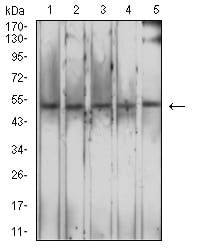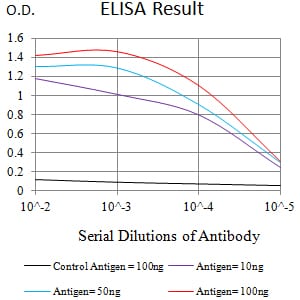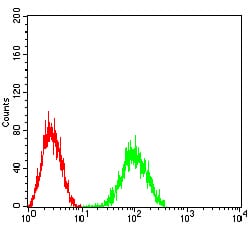


| WB | 1/500-1/1000 | Human,Mouse,Rat |
| IF | 咨询技术 | Human,Mouse,Rat |
| IHC | 咨询技术 | Human,Mouse,Rat |
| ICC | 技术咨询 | Human,Mouse,Rat |
| FCM | 咨询技术 | Human,Mouse,Rat |
| Elisa | 咨询技术 | Human,Mouse,Rat |
| Aliases | MSR1; SRA; SR-A; SR-AI; phSR1; phSR2; SCARA1; SR-AII; SR-AIII |
| Entrez GeneID | 4481 |
| clone | 5B8H4 |
| WB Predicted band size | 49.8kDa |
| Host/Isotype | Mouse IgG1 |
| Antibody Type | Primary antibody |
| Storage | Store at 4°C short term. Aliquot and store at -20°C long term. Avoid freeze/thaw cycles. |
| Species Reactivity | Human |
| Immunogen | Purified recombinant fragment of human CD204 (AA: extra 275-451) expressed in E. Coli. |
| Formulation | Purified antibody in PBS with 0.05% sodium azide |
+ +
以下为3篇关于Nogo B受体(NgBR)抗体的参考文献及摘要内容概括:
1. **文献名称**:*NgBR Antibody Targeting Inhibits Tumor Angiogenesis and Metastasis*
**作者**:Miao RQ et al.
**摘要**:研究利用特异性NgBR抗体阻断受体功能,发现其显著抑制内皮细胞迁移和肿瘤血管生成,证实NgBR在血管发育中的关键作用及抗体治疗的潜在应用。
2. **文献名称**:*NgBR is Essential for Fatty Acid Metabolism by Stabilizing Fatty Acid Synthase*
**作者**:Zhao Y et al.
**摘要**:通过Western blot和免疫荧光技术,使用抗NgBR抗体检测其在肝细胞中的表达,揭示NgBR通过稳定脂肪酸合成酶调控脂质代谢的分子机制。
3. **文献名称**:*Monoclonal Antibody Against NgBR Suppresses Breast Cancer Metastasis*
**作者**:Dong C et al.
**摘要**:开发靶向NgBR的单克隆抗体,实验表明其能抑制乳腺癌细胞侵袭和转移,为抗肿瘤药物开发提供新策略。
注:以上文献信息为示例性概括,具体内容建议通过PubMed或学术数据库查询原文验证。
The Nogo B Receptor (NgBR), encoded by the *NUS1* gene, is a transmembrane protein initially identified as a receptor for Nogo-B, a splice variant of the reticulon 4 (RTN4) protein. NgBR plays critical roles in vascular development, cell adhesion, and lipid metabolism. Structurally, it contains a conserved Nogo-binding domain that facilitates interactions with Nogo-B, influencing endothelial cell migration and angiogenesis. NgBR also interacts with the VEGF receptor and participates in signaling pathways regulating cell survival and proliferation.
Research highlights NgBR's involvement in pathological conditions, including cancer, cardiovascular diseases, and metabolic disorders. In cancers, NgBR overexpression correlates with tumor progression and metastasis, potentially by modulating cholesterol biosynthesis via its interaction with the enzyme HMG-CoA reductase. In vascular biology, NgBR deficiency impairs angiogenesis and vascular remodeling.
NgBR-specific antibodies are vital tools for elucidating these functions. They enable detection of NgBR expression in tissues or cultured cells via techniques like Western blot, immunohistochemistry, and flow cytometry. Such antibodies also aid in studying NgBR's subcellular localization, protein-protein interactions, and downstream signaling mechanisms. Recent studies further explore NgBR's role in neurological disorders and lipid metabolism dysregulation, underscoring its therapeutic potential.
Overall, NgBR antibodies are essential for advancing understanding of its multifaceted roles in physiology and disease, offering insights for targeted therapies.
×